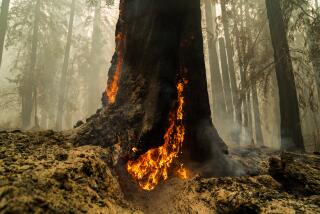A Guestâs Luck : WATCH FIRE, <i> By Christopher Merrill (White Pine Press: $14; 191 pp.)</i>
Luckâs a language learned by fits and
starts--
Numbers, dates, an odd word; an
alphabet
Of chance from which whole phrases sometimes come,
Then vanish, like water from a
desert wash. . . .
From âLuckâ
Echoes, coincidences, chance resemblances, and the phantasms of desire are Merrillâs luck. On the lookout for such apparitions, he makes his way through broken country. Roads, in these poems, are to be crossed, not followed, and alertness is the litany that the poet paces off. Luck rises up and beckons like a mirage, like the mysterious identity of ânowâ and âthenâ along memoryâs branch. Merrill discovers constellations in the moss; a fatherâs diligence in the late-night labors of a tugboat; the marriage of salt flats and a grave. He points to the woman in a tree with yellow leaves and helps us listen for an anthem in the bawling of a calf.
In short, Christopher Merrill pursues his luck through âCorrespondences.â This is both the title of a section in his âChildrenâs Suiteâ and a word closely associated with such descendants of the French symbolists as Andre Breton, Rene Char, and Jaime Sabines. In his translations from these three poets, as well as in his allusions and dedications to them, Merrill conveys the genealogy of an arresting imagination. He loves the predecessors who have lent their strange velocity to his own images. No anxiety of influence prevails here; nor is there evidence of a desire to follow any models too closely. Rather, there is a generosity that names names, offers praise, then contributes something new. Merrill lives in a landscape of names, surrounded by eloquent scraps of language allowing him to chant the sensesâ progress through the world. Hereâs the poet strolling past the morningâs catch in âPike Place Market Variations:â
O savor of salt
and salmon--the holy
And nomadic chinook
neatly filleted in ice;
The king and coho
caught by a troller
Or gleaned from a gill net,
gulls circling overhead
And loaves of baked bread
steaming in waxed bags,
Salt-rising and sourdough,
the settlersâ legacy . . .
In the gusto of his alliteration and the pulse of his divided lines, Merrill recalls an Anglo-Saxon catalogue of praise. But his discovery of epic possibilities in a stroll through the morning of a modern city is also very much in the American grain. Such exuberance recalls Whitmanâs bardic songs of Brooklyn, Ginsbergâs hymns of praise in a California supermarket, Levertovâs calls to taste and see.
Another strong association of the word âcorrespondencesâ is with the Puritanism of Jonathan Edwards, who found âTypesâ of Divine Truth throughout the natural world and who, through the conduit of Emerson, inspired Whitman and the American poetry of natural revelation. While a reader hears many echoes of beloved American poets in Merrillâs book, the figure who feels most immediately present is Robert Frost. One dimension of this affinity is the ardent, yet cagey vision of nature in the work of both poets--suggesting much more than they will ever own to or assert. But there is also a formal connection that might be over- looked by a reader impressed with Merrillâs delight in such forms as single-line aphorisms, prose-paragraphs, and the deftly suspended broken lines of W.S. Merwin. For he also employs blank verse in a number of the poems here, and with an authority that recalls Frost. In the opening stanza of âCoastline,â for instance, his iambic pentameter lines surge with an organic, dynamic quality that bears comparison with Frostâs superb opening in âDirective.â
That inland sea whose coastlines keep expanding.
That ancient ocean in which nothing lives
Save the brine shrimp culled for aquariums
And skittering on its surface hordes of flies
Hoarding our slackening attention, that thought
Which swelled with mountain runoff until it swamped
Sailboats and railroad tracks, saltworks and roads
Still rises since the foothills stripped of timber
Hold nothing back--snowmelt, and mud, and rancor.
Of all his impressive gifts as a poet, the suppleness of rhythms like these is what I value most about âWatch Fire.â Merrill begins the stanza with an almost regular iambic beat; then he slowly gathers up the third line, blurts out the next; he pulls back again in the fifth, but lets go again into the racing flood of lines six through eight. The rhythm of the ninth and final line brings the sentence of this natural disaster to a full, dead stop. Like Frost in âDirectiveâ (and for that matter like Milton at the beginning of âParadise Lost,â) Merrill also understands the enormous potential in blank verse for suspense. Only after seven lines of ominous distractions does the inland ocean of his syntax arrive (âstill risesâ) at its main verb.
The fundamental meaning of a poem is rhythmic, not thematic, though in living poetry rhythm always enters into a dialogue with the attendant themes. Whatever the basic form, thereâs a feeling of joy in Merrillâs rhythms, as in the improvisations of a skilled athlete. In âA Boy Juggling a Soccer Ball,â the first 36 lines are one long sentence. Within this tour de force we watch the boy,
. . . now catching
and tapping on the soft
side of his foot, and juggling
once, twice, three times,
hopping on one foot like a jump-roper
in the gym, now trapping
and holding the ball in midair,
balancing in on the instep
of his weak left foot, steeping forward
and forward and back . . .
Just so, the poet revels in retaining rhythmic balance through a delicious process of recoveries and compensations. This equations of athletic intuition with the poetâs work finds another eloquent figure in âOld Wivesâ Tales,â where Merrill writes,
Now the worlds glide, like skates, over the pages
Of the man who rose at daybreak, praying for clear
Weather and words with which to carve a figure
For his joy and grief; the boy who skated along
On the pond in the woods, his hockey stick the rudder
For his rushes up and down the melting ice.
The glide and rush of a life in poetry accord for Merrill with another word as prominent in âWatch Firesâ as luck : that word is guest . His opening poem here is in fact called âThe Guests.â In its placement as a sort of invitation and its deceptive simplicity, it recalls âThe Pasture,â which Frost used as the introduction to his own collected poems. âThe Guestsâ concludes:
And if the earth begins
To hum, and the dry wells refill themselves
The guests may close their eyes--and sing.
When one is a guest in another country, one feels at once disoriented and alert, missing many connections obvious to the natives of that place, yet also amazed by patterns that more familiarity might have obscured. When one is a guest in anotherâs home one feels grateful for the hospitality, eager to enjoy and, elsewhere, to reciprocate. In both cases, one may also long for oneâs own home, or long to have a home. Christopher Merrillâs poems convey the heightened vividness, inseparable from apprehensiveness, of one who is passing through. He is grateful for the grace of true connections, careful not to assume too much, open to what comes next. Merrill understands, likewise, that impulses and experiences are guests within our lives, passing through with unforeseen effects. In the fifth paragraph of âA Primer,â he writes of how âin the course of opening and closing our doors and magazines, of drawing the curtains against the street lampsâ glare, a note of surprise--an unexpected guest--(may) wander into our quiet conversation and lead us not into temptation but up into the canyon. . . .â âWatch Fireâ is a remarkably original, ambitious, and unified volume of poetry. Reading and re-reading it felt like encountering a true piece of luck--a chance to leave the expected road and follow the echoes of the present out into the world.
More to Read
Sign up for our Book Club newsletter
Get the latest news, events and more from the Los Angeles Times Book Club, and help us get L.A. reading and talking.
You may occasionally receive promotional content from the Los Angeles Times.







